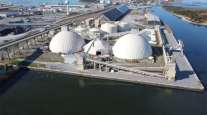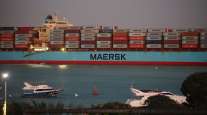Bloomberg News
Maritime Shipping Industry, Asian Nations Object to EU Pollution Plan

[Ensure you have all the info you need in these unprecedented times. Subscribe now.]
Plans to extend the world’s biggest carbon market into shipping drew criticism from the industry and Asian nations, highlighting growing conflict over Europe’s unprecedented moves to protect the environment.
The 27 nations in the European Union are drafting measures to include pollution from maritime transport from at least intra-EU routes in the bloc’s Emissions Trading System. It’s part of the Green Deal, a radical overhaul of the economy aimed at putting Europe in the lead of the fight against climate change.
Japan and South Korea joined the World Shipping Council in expressing concerns about the move. They say global emissions from ships should be regulated by the International Maritime Organization and that regional efforts will only hinder progress. While the IMO has pledged to cut shipping emissions in half by 2050, a requirement to improve the efficiency of vessels before then has come under criticism from environmental groups for not going far enough to tackle climate change.

“Japan believes that extension of EU ETS to international shipping is not the suggested way forward, whether the scope is limited to intra-EU shipping only or not,” the government in Tokyo told the EU in a document dated Nov. 24. “EU ETS in international shipping will not deliver ambitious emission reduction effects, while leaving the risk of carbon-leakage and significant distortion in global maritime transport and trades involving non-EU third countries including Japan.”
About 90% of the world’s physical trade is moved by ship, and the sector spews about as much CO2 into the atmosphere as Germany and France combined.
The groups objecting to the new EU rules haven’t found a legislative path for endorsing the IMO’s proposals adopted earlier this month.
Shipping is the second global transport sector that the EU is targeting in its campaign against climate change after an attempt to put a carbon price on international flights. That plan had to be scaled back in 2012 amid threats of a trade war from countries including China, Russia and the U.S.
How did turkey-to-table change this year? What obstacles were suppliers going through to get turkeys to grocery stores? Join us as we talk with J.J. Smith, President of Valley Proteins, about how staying open-minded and flexible helped his business of delivering turkeys persevere. Hear a snippet, above, and get the full program by going to RoadSigns.TTNews.com.
Adding domestic shipping routes to the EU ETS could increase its annual cap by 48 million metric tons of CO2 on an annual basis, according to BloombergNEF. If international routes are also considered, the cap could increase by a further 97 million tons. That would value the additional emissions at 2.7 billion euros ($3.2 billion) based on the Nov. 26 carbon price of about 28 euros a metric ton.
“Shipping is a hard-to-abate sector that is likely to have high demand for allowances,” BloombergNEF analysts including Emily Jackson and Jahn Olsen said in a report Nov. 26. “This demand is likely to increase the European carbon allowance prices. On the other hand, if levels of free allocation are generous, demand will be low.”
The European Commission, the EU’s regulatory arm, plans to unveil a revised law on its carbon cap-and-trade program in June. It will include tougher requirements for 12,000 companies already covered by the system and rules for the inclusion of shipping. The commission also is considering extending the carbon market to road transport and the building sector.
“The application of EU-ETS to international shipping will have adverse repercussions on both environmental integrity and sustainability of global maritime transport and trade,” South Korea said in a document submitted as part of EU consultations on the planned measure.
Want more news? Listen to today's daily briefing:
Subscribe: Apple Podcasts | Spotify | Amazon Alexa | Google Assistant | More





